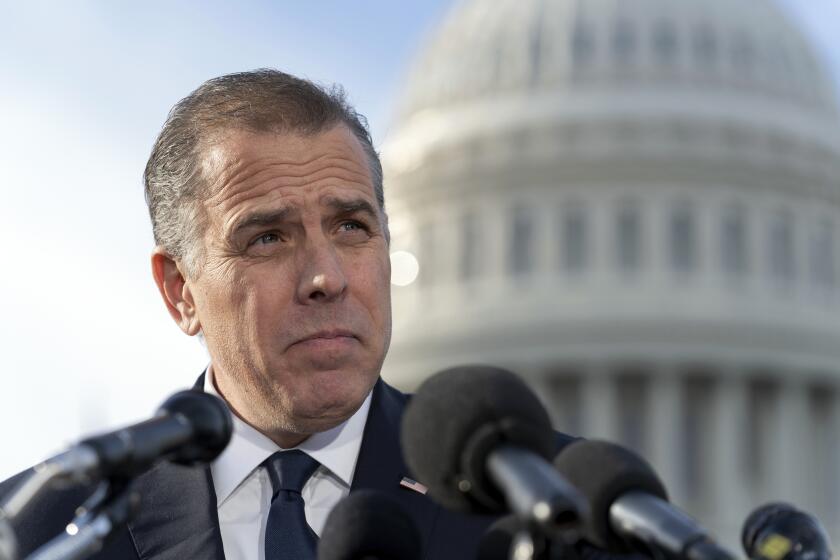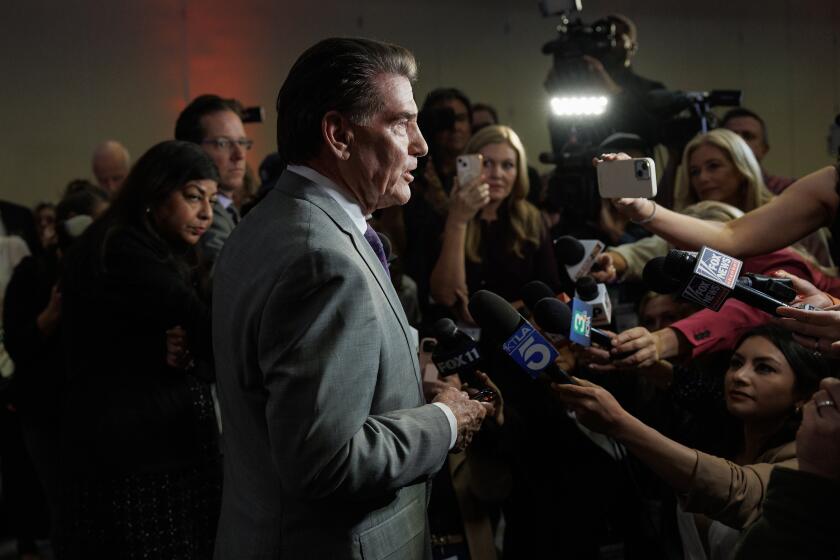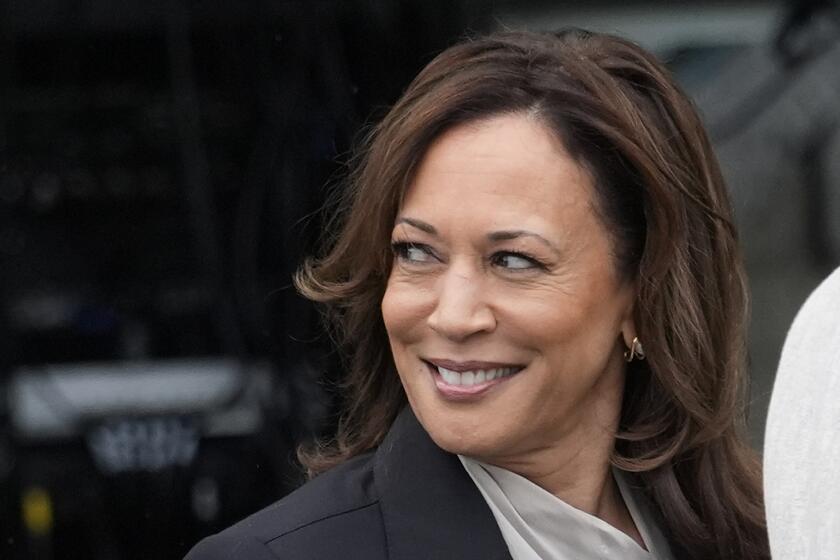Corporations and free speech; partisanship and the Supreme Court; rethinking homeland security
FOR THE RECORD:
Supreme Court: A photo caption with the Jan. 26 Letters stated that Justice Stephen G. Breyer voted to lift bans on corporate campaign contributions in Citizens United vs. Federal Election Commission. Breyer dissented from that holding. —
Corporate speech
Re “Campaign finance rule reversed,” Jan. 22
Last week, the Supreme Court overturned a century of legal precedent and used a narrow case about a political-attack documentary to rule that there is no difference between corporations and individuals.
Corporations are now invited to spend as much money as they wish to elect or defeat any candidate of their choosing.
Corporations and their lobbies already call most of the shots in Washington, but this latest ruling adds to the Republican philosophy that the purpose of government is to benefit the rich and powerful.
Republicans have finally succeeded in turning the Supreme Court into an arm of the Republican Party. This spells the end of democracy in America.
Roger Johnson
San Clemente
The Supreme Court claimed that corporations have the same right to free speech as individuals. This ruling has indeed made individual voices less “free,” and much more expensive.
Imagine a candidate who supports controls on health insurance costs. Your $100 donation to that candidate will pale next to your insurer’s television commercials to defeat him or her.
Imagine giving a $25 donation to a candidate who supports stronger emissions standards. The spending of the manufacturers of your car will make your contribution nearly meaningless.
A corporation is not a person. It’s not even a representative group of people. It’s a CEO and a board with lots of money -- some of it your money -- with a dedicated interest in making lots more money for itself.
Watch those TV commercials. Read the mailings. Check out the newspaper ads. Be sure to remember who paid for them when you are in the voting booth.
Margaret Baker Davis
La Verne
For over 50 years, I have never missed voting. I must admit, though, that in recent years I have come close to not voting because of the corporate and special-interest money infecting our elections.
Now, thanks to the Supreme Court, these organizations have practically an unfettered ability to affect an election. It seems to me that my vote is meaningless against that kind of competition. I guess it’s time for me to throw in the towel, quit voting and let the corporations and special interests run the country -- which they’re pretty much doing anyway. It’s a sad day in America.
Edward J. Hieshetter
San Diego
Well, it’s official now: It’s government by the corporations, for the corporations and of the corporations.
How can conservative justices, who supposedly hold to the strict construction of the Constitution, find a right of free speech for corporations in a document that does not even mention them? How can this decision be reconciled with the original intent of the founders? Is the meaning of the Constitution in current jurisprudence to be found in the politics du jour of a majority of sitting justices?
John H. Geerken
Claremont
The writer is a professor emeritus of history at Scripps College.
Great. Soon politicians will grant naming rights to their largest campaign contributors: John McCain will become known as the “Merrill Lynch Senator from Arizona” and John Cornyn the “ Exxon Mobil Senator from Texas.”
It could get tricky, though: Republican John Ensign and Democrat Harry Reid might have to flip a coin to see who’ll be the “MGM Mirage Senator from Nevada.”
Linnea Warren
Pasadena
The decision to remove the restriction on corporate political contributions has turned “free speech” into an oxymoron. The more money you spend, the more “free speech” you get.
Are the five conservative justices language-challenged or simply devoid of common sense?
Rick Krizman
Santa Monica
So I guess now we have the Supreme Corp.
Paul Feinsinger
Agoura Hills
Partisanship and the court
Re “A partisan court unmasked,” Opinion, Jan. 23
Tim Rutten hits the nail on the head but does not go far enough.
Did Chief Justice John G. Roberts Jr. perjure himself at his confirmation hearings? He posed as an incrementalist who would be respectful of past decisions. Yet he deliberately went beyond the narrow focus of this case.
These should be grounds for his impeachment. Roberts has lost any credibility as a serious adjudicator. He is an unabashed water carrier for corporate America.
Jamshed Dastur
Newport Beach
What lovely irony: Democratic partisan Rutten rails against the “partisan” Supreme Court for recognizing that corporations have a right to political speech.
Rutten says the court’s partisanship was revealed by the 5-4 split. But why cast the blame at the majority rather than at the dissenters? I don’t recall Rutten castigating the California Supreme Court when it split 4 to 3 to create same-sex marriage. Nor would he have complained about Brown vs. Board of Education had that case not been unanimous.
What is partisan is the Democratic rage at the Supreme Court decision.
President Obama and his allies treat corporations with hostility at the expense of the U.S. economy. They’re terrified that corporations will now get to weigh in. But that’s politics.
Corporations will have their soapboxes, just as Rutten has his -- bought and paid for by his corporate employer.
Steven Zak
Sunland
I agree with Rutten that corporate and union funding of vile campaign commercials can undermine faith in our electoral process. But even the most eloquent campaign-finance jeremiad can’t deny that paying to promote a viewpoint is political speech, the purest form of expression guaranteed by the 1st Amendment.
This simple fact makes the court’s ruling exasperatingly but inescapably correct.
Steve Meister
Sherman Oaks
Reading the Constitution
Re “Who are the judicial activists now?” Jan. 22
The 1st Amendment to the Constitution reads, in part: “Congress shall make no law . . . abridging the freedom of speech, or of the press . . . “
The framers made no distinctions and set no conditions. Speech is free, and Congress doesn’t have the power to restrict it. It’s hard to imagine how the framers could have been more clear.
But Erwin Chemerinsky, a law school dean, says that “there is not the slightest shred of evidence that the framers of the 1st Amendment meant to protect the rights of corporations to spend money in election campaigns.”
If the framers had intended to restrict the free-speech rights of corporations, they could have said so.
George W. Carlyle
Newport Beach
How to defend the homeland
Gregory F. Treverton predicts that, in spite of our best security efforts, America will not be able to prevent all attacks on our soil. Most people understand that.
The question: how to cope with such a likelihood? Surely, the temporary national partial paralysis following 9/11 is no model.
What is needed is a national indoctrination program for all citizens, offered as a parallel to the disaster training programs carried out regularly by medical, police and fire personnel.
Future attacks might cripple the national power grid or communications systems. That could induce widespread panic and be more debilitating than the actual impact of the attacks.
The indoctrination objectives might be: “Stay the course. Stay on the job. Be resolute.” People should understand that doing otherwise will be proof to terrorists that their attacks succeeded.
John M. Freter
Yucca Valley
More to Read
Get the L.A. Times Politics newsletter
Deeply reported insights into legislation, politics and policy from Sacramento, Washington and beyond. In your inbox three times per week.
You may occasionally receive promotional content from the Los Angeles Times.






